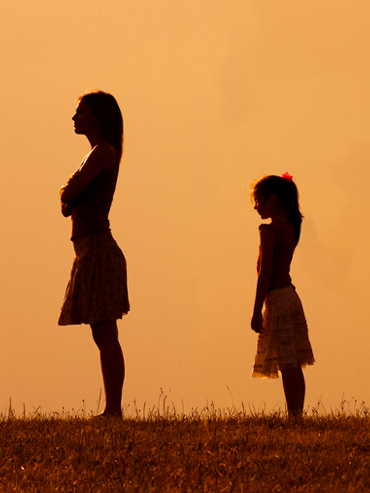“I Don’t Think I Was Meant to Have a Mom”
Being estranged from your mother makes the lead-up to Mother’s Day a particular kind of painful


There’s something about Mother’s Day—or more specifically, not celebrating Mother’s Day—that invites strangers to scold you. Your mom is supposed to be your built-in best friend! And no mother, no matter how toxic or abusive, should be forgotten on Mother’s Day, of all days! In fact, even if she was toxic or abusive, you should definitely forgive her, because she’s your mom and “she tried her best!” But as someone estranged from my mother, all the forced enthusiasm feels like watching a Lifetime movie. That is, fiction. It’s all so happy. Too happy to be real.
And don’t even get me started on the capitalist push to buy her flowers and diamonds and Pandora bracelets and spa days and and and… It’s a lot. So much that I used to block every single email, ad, notification and Facebook alert that announced the coming holiday. I can’t tell you how many brands I’ve blocked because of it. But, like clockwork, other ads from other brands still made it through my blockade.
Eventually, I realized that what I was doing was never going to be sustainable. Blocking those ads was just me avoiding the problem instead of confronting it. After I’d cut off contact with my mom, I thought I’d completely solved the problem. But that was really only a partial fix. If I wanted a sustainable solution, I had to find peace.
The first time I tried to cut off contact
My first estrangement from my mom came three years ago, after I told her I was getting married to my then-girlfriend. She didn’t take it well.
Our relationship hadn’t ever been the rose-tinted mother-daughter relationships that ads or TV shows push around Mother’s Day. Honestly, it was mostly toxic interspersed with happier moments. But the decision to distance myself from my mom as an adult still wasn’t easy. After I announced my wedding plans, she texted me Bible verse after Bible verse multiple times a day as a way to convert me to heterosexuality. She’d call from my hometown of Detroit crying, and I’d stay on the phone because I felt bad and responsible for her pain. She’d have me read yet more Bible verses, these ones about honouring your parents because it’s in the Ten Commandments.
It got to the point that I was so stressed from the situation that my skin broke out into hives and then eczema. I had crying spells and would start hyperventilating. I stopped eating and lost a lot of weight. Sometime after my wedding, my partner eventually had to take my phone and block my mom to get me to calm down. I knew that I needed boundaries, but I found it impossible to set them. Boundaries had never been a strength of mine, but I think they’re especially difficult to set for your parents. There’s a sense of obligation that is difficult to overcome.
I tried to rekindle my relationship with my mom, but it didn’t work
To be honest, I was also hoping that this would be the point in our relationship where we’d either fall apart or finally become the mother-daughter best friend duo I’d always wanted us to be. Then, a friend called me and suggested that I engage with my mother, or else nothing would change. I wondered if this was the push we needed to overcome our differences. I unblocked her—and the texts and calls immediately started again.
Then, sometime after my wedding in May 2016, another friend I’d lost contact with texted me to catch up. I told her about my situation and sent some screenshots of my mom’s texts, and she called me to ask if I was okay. She sounded worried for my safety, and I realized that I needed to end communication with my mom altogether. I blocked her again.
Undeterred, my mom started calling my friends to get information about me. When they declined, she pulled up to the house of my college ex to ask about me. When that failed, she resorted to badmouthing me to cousins at family events I didn’t attend. If before I’d lacked boundaries, I’d finally set one she couldn’t cross.
When my marriage ended in March 2017, I had to move back stateside. And, since I’d been unemployed for months and had burned through my savings, I needed help. So, I called my dad. (Even though I wasn’t speaking to my mom, he would still call me every week to check in on me.) He and my mom drove from Detroit to Toronto to move my things, and when we finally crossed the border, she handed me a letter that said, essentially, that I was an abomination that needed to be fixed by God. It was my breaking point. That night, I chose to be homeless rather than live in the same house with her. She texted me a few months later and I responded that I’d be filing a restraining order if she continued trying to contact me. It finally stopped.
Even after we became estranged, I blamed myself
When you’re a woman who stops talking to your mother, a lot of the blame from strangers falls on your shoulders. What kind of monster cuts off contact with their mother, right? I can’t tell you the number of times I’ve heard, “But she’s your mom! You only get one mom.” Or, “Well you should be thankful you even have a mom. Some people’s moms are dead.”
For a long time, I agreed with them. I felt like I was to blame for how I was being treated. I’d think, “Maybe I should have been more grateful. Maybe they’re right: I do only get one mom. Maybe I need to see this from her perspective. She did feed me, clothe me, pay for music lessons, pay for college, help me find an apartment, build my credit history. Maybe I’m wrong. What if I’m wrong?”
I felt responsible for my mom’s feelings and her actions. I couldn’t say no. I thought that maybe if I let her harass me with Biblical texts and phone calls and prayers she’d run out of steam and finally see that what she was doing was hurting me. But all it really did was show her that I’d keep letting her treat me however she wanted to treat me with no repercussions.
I had to learn to mother myself
By the time I brought up a restraining order, I’d already stopped thinking of her as my mom. In fact, I’d stopped believing in the idea of motherhood at all. I’ve spent most of my life appealing to my mom in the hope that she’d accept and love me unconditionally. But, I now saw that I’d been treating myself the way she had been treating me all along—tearing myself down, finding faults in everything I did.
For years, I wished I could ask her all sorts of questions. Should I marry this woman? Is it too soon? Do I have enough money saved for a rainy day? Is it wise to advocate for myself harder at this mostly-white employer or should I drop it? My wife is taking advantage of me. Is this my fault? Can you help me leave? Can I lean on you?
It wasn’t until I was 24 and I’d cut off contact with my mother that I realized I could answer those questions myself. When I spent time with my oldest sister and her family over the course of holiday visits and watched how freely and lovingly they interacted with each other, I saw that I couldn’t just wait for someone else to make the effort. I had to act. That realization prompted me to learn how to mother myself the way I had always wished my mother would—to be patient, accepting, proud, gentle, kind, stern, devoted and an advocate for my own betterment.
I now celebrate Mother’s Day again—but in my own way
Another thing I learned was that it didn’t have to just be me. Having only myself to rely on wasn’t enough, because I’m not an island. But I have friends to lean on. I can lean on my oldest sister. I have a community of women who love me and uplift and affirm me. And I celebrate them for Mother’s Day.
I know this sounds extreme, but I don’t think I was meant to have a mom. Admitting that, for me, is healing. It means that I’ve stopped pining for something that has been unattainable and a source of pain for so long. It means that I can let go and move forward and be the support I need to be for myself. It’s freeing.
Once I got comfortable with this thought and embraced it without resentment, I stopped blocking the Mother’s Day ads and emails. In fact, there’s a few in my inbox right now. They don’t hurt anymore.
Related:
“No, This Isn’t Okay Anymore:” How I Finally Set Boundaries With My Abusive Dad
Why Ghosting Is a Form of Self-Protection for Women
Julie Lalonde on How to Support a Friend in an Abusive Relationship








